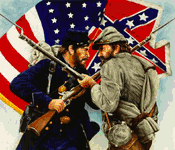 |
Civil War Battles |
|
State War Records |
| AL - AK - AZ - AR - CA - CO - CT - DE - FL - GA - HI - ID - IL - IN - IA - KS - KY - LA - MA - MD - ME - MI - MN - MS - MO - MT - NE - NV - NH - NJ - NM - NY - NC - ND - OH - OK - OR - PA - RI - SC - SD - TN - TX - UT - VT - VA - WA - WV - WI - WY |
The Battle of Fort Fisher
December 7-27, 1864 in Fort Fisher, New Hanover County, North Carolina
 |
|||||||||||||||||||||
|
Maj. Gen. Benjamin Butler was relieved of command of the Army of the James and assigned to lead an amphibious expedition against Fort Fisher, which protected Wilmington, the South's last open seaport on the Atlantic coast. Learning that large numbers of Union troops had embarked from Hampton Roads on December 13, Gen. Robert E. Lee dispatched Hoke's Division to meet the expected attack on Fort Fisher.
On the 24th, the Union fleet under Rear Adm. David D. Porter arrived to begin shelling the fort. An infantry division disembarked from transports to test the fort's defenses. The Union assault on the fort had already begun when Hoke approached, discouraging further Union attempts.
Butler called off the expedition on the 27th and returned to Fort Monroe.
The fiasco at Fort Fisher, specifically Butler's disobeyance of his direct orders—orders which Butler failed to communicate either to Porter or to Weitzel—gave Grant an excuse to relieve Butler, replacing him in command of the Army of the James by Major General Edward Ord. President Abraham Lincoln, recently reelected, no longer needed to keep the prominent Republican in the Army and he was relieved on January 8, 1865. To Butler's further embarrassment, Fort Fisher fell one week later when Major General Alfred H. Terry led a second assault against the Confederate stronghold; while defending his decision to break off the attack before the Joint Committee on the Conduct of the War, Butler had deemed the fort impregnable.
Confederate losses amounted to five killed and mortally wounded, fifty-six wounded, and six hundred captured, while the damage caused by the bombardment was quickly repaired. Blockade runners continued using the port, the next ships to arrive did so the very night the Union fleet withdrew. Although Whiting and Lamb were convinced that the Union force would shortly return, Bragg withdrew Hoke's Division back to Wilmington and started making plans to recapture New Burn.
